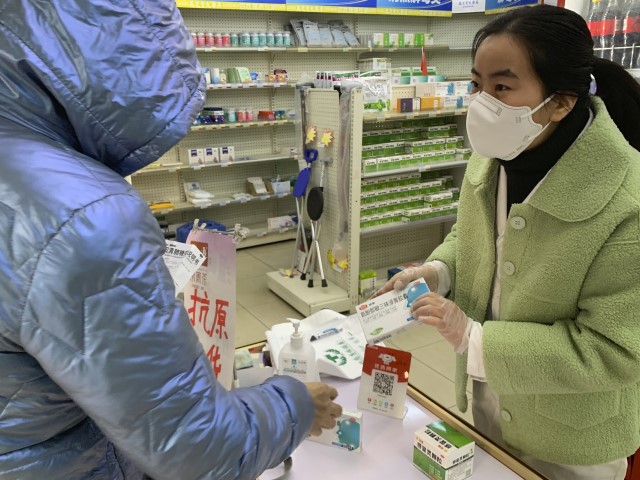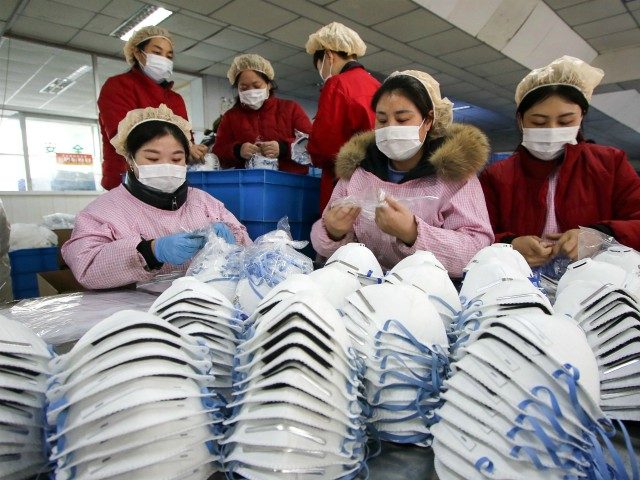Chinese state media looked for a bright side to the relaxation of dictator Xi Jinping’s deranged “zero Covid” policies this week by touting the anticipated surge of demand for masks and over-the-counter cold medications.
The Chinese Communist Party still refuses to admit there was anything wrong with zero Covid, aside from suggesting that a few local officials might have gotten carried away with implementing Xi’s perfect strategy for controlling the Wuhan coronavirus. The official euphemism settled on by Communist officials over the past two weeks, employed with rigid conformity throughout Chinese state media, is “optimizing” – not “loosening” or “rolling back.”
In the face of massive public protests following atrocious deaths caused by coronavirus lockdowns, which Beijing unsuccessfully tried to dismiss as whipped up by foreign agents, the regime announced last week that it would roll back some of the most draconian quarantine policies.
The regime then attempted to blame the surge of coronavirus infections across China on the relaxed restrictions, an assertion the World Health Organization (W.H.O.) strongly disputed on Thursday.
Among other counterpoints, W.H.O. noted the documentary evidence that Chinese coronavirus cases were surging long before restrictions were relaxed – this was, indeed, one of the reasons anti-lockdown protests spread like wildfire across China. People were angry that coronavirus infections were rising despite those ham-fisted city-wide lockdowns and testing mandates; they objected to suffering under lockdowns but then getting omicron waves anyway, and they wondered why China couldn’t learn to live with the Wuhan virus like the rest of the world.
On Tuesday, the state-run Global Times looked for a silver lining in this grim political, economic, and healthcare cloud by reporting that “Chinese medical equipment manufacturers are ramping up production to meet the surging demand for protective masks, fever reduction tablets and electrolytic water.”

Pharmacist Zhu Qianqian prepares medication for a customer at a pharmacy in Beijing, Wednesday, December 14, 2022. (Dake Kang/AP)
The evidence for surging demand was a bit thin, consisting of a spike in searches for N95 masks on Chinese websites and one Global Times reporter finding the medical-grade masks out of stock at a few online retailers. N95 masks are far more effective than cloth masks and similar alternatives, but they have not been as widely used during the pandemic because they are also much more expensive, require some training to use properly, and are frequently in short supply.
The Global Times quoted other manufacturers who anticipated soaring public demand for products that could treat the symptoms of the more contagious, but usually more mild, omicron variants of Chinese coronavirus, including disinfectants, electrolytic water, and especially ibuprofen. These predictions of skyrocketing demand were, again, based largely on spiking Internet searches.
“Shandong Xinhua Pharmaceutical Co is one of two major producers of the raw material of ibuprofen. A representative of the company told the Global Times via its investor hotline that its plants are scrambling to produce more ibuprofen raw materials to meet the soaring demand, and the capacity will be adjusted based on market needs,” the Chinese Communist paper reported.
Another Global Times article found pharmaceutical stocks rising due to “media reports of such drugs being in hot demand,” such as the reports filed by the Global Times itself.
Shandong Xinhua Pharmaceutical and its ibuprofen production were once again touted as a sign of economic gold in those dismal coronavirus hills, along with “booming demand” for some Chinese herbal medicines, and strong Chinese retail sales for imported Western cold medicines and vitamin supplements.
The Global Times applauded Chinese government agencies for managing this surge in demand through measures such as tighter inspections of medical production lines, higher quality standards for imports, and even providing a list of which traditional remedies work best for various coronavirus symptoms. The article concluded by quoting analysts who said bare store shelves would not be a problem, since production is surging early to meet anticipated demand.

COMMENTS
Please let us know if you're having issues with commenting.